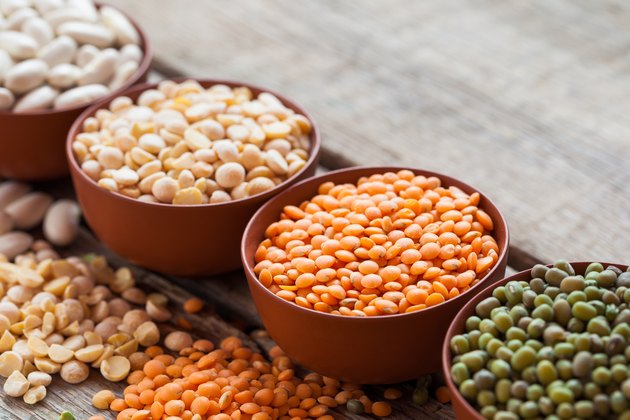Physiology, Supplements
The Best Iron Supplement for Low Ferritin Levels
Iron deficiency, typically measured as ferritin in your blood, is the most common nutritional deficiency in the United States. This mineral is a part of all your cells and most enzymes. As a component of hemoglobin, iron is vital for carrying oxygen throughout your body. Insufficient hemoglobin results in anemia, a condition characterized by weakness, fatigue and suppressed immunity. There is an array of iron supplements to boost ferritin levels, but select one your body absorbs well and doesn’t cause unpleasant side effects.

Ferritin Explained
Ferritin is a protein in your cells responsible for storing iron for future use. If your doctor orders a blood draw to determine your ferritin levels, he is measuring the amount of iron in your blood. Your blood ferritin levels correspond to how much iron you have stored. Males should have a ferritin level between 12 and 300 nanograms per milliliter and females should have a level between 12 and 150 nanograms per milliliter. Even at the low end of this range, your iron stores are inadequate and your doctor might recommend an iron supplement.
Choosing a Supplement
Most iron supplements are available without a prescription, and you can easily become overwhelmed by all your choices. You’ll find tablets, capsules and liquid drops with differing amounts of iron, iron salts, combinations and dosing requirements. Iron pills are frequently offered as ferric or ferrous. According to anemia.org, your body absorbs ferrous salts best, which you’ll readily find as ferrous sulfate, ferrous gluconate and ferrous fumerate. All three are easily absorbed, but ferrous sulfate costs less and is most commonly used.
Taking Your Supplement
Take your iron supplement 2 to 3 times a day because the more iron you take at once, the less you absorb. Your stomach needs to dissolve iron supplements quickly so the iron can be absorbed in your intestines. Long-acting supplements don’t dissolve in your stomach and may be completely useless. Caffeine and calcium-containing foods and beverages interfere with iron, but vitamin C boosts iron absorption. If you are on medication, speak with your doctor. Certain medications, including antacids, H-2 receptor blockers and proton pump inhibitors decrease iron absorption.
Side Effects
Iron supplements may cause uncomfortable gastrointestinal side effects including nausea, vomiting, constipation, diarrhea and stomach pain. Increase your iron intake by taking half of the recommended dose and slowly increasing to the full dose. Divide the dose or take it with food, although this can decrease how much you are absorbing. You can also take a stool softener to treat constipation or consider another supplement form. (reference 3) The Office of Dietary Supplements states heme polypeptides, carbonyl iron, iron amino acid chelates and polysaccharide-iron complexes have fewer reported side effects.
What Are the Best Iron Supplements for Women?

Tip
Iron supplements can be found in multivitamins, iron pills and iron-rich food.
Iron Supplements for Women
The National Institutes of Health’s recommended dietary allowance of iron for menstruating adult women is 18 milligrams per day. If you eat a balanced diet, and especially some meat or seafood, it’s fairly easy to get enough iron from your diet. Taking a multivitamin with minerals can give you added insurance that you’re meeting your iron needs, and most over-the-counter women’s multivitamins contain the recommended 18 milligrams of iron. According to ConsumerLab, a company that tests vitamins for quality, there are some quality differences among multivitamin brands, but in general, products sold by vitamin chains offer good quality, and those sold under some big box store brand names provide similar quality but at a lower price.
Iron Supplements for Anemia
Iron deficiency can lead to anemia, or lowered amount of red blood cells. If you’re iron-deficient, your doctor may recommend taking an iron supplement for anemia. They can come in various forms, including ferrous sulfate, ferrous gluconate or ferric citrate, each of which contains varying amounts of elemental iron, so make sure you compare the total amount of elemental iron when choosing a supplement. For some people, taking more than 45 milligrams of iron can cause gastrointestinal side effects like nausea and constipation. If you experience any uncomfortable side effects, ask your doctor if you should change the type of supplement you’re taking, or consider a slow-release formula, which may be gentler on your GI system.
Iron Food Sources
Before you consider taking any supplemental iron pills, be sure you are getting plenty of iron from your diet. Foods like meats and seafood are good sources, and they are especially well absorbed by the body. Fortified breakfast cereals, legumes, tofu, leafy greens and and dark chocolate are other good sources of iron. If you need to get additional iron in your diet, try to eat some of these foods at each meal.
Vitamin C Iron Booster
Vitamin C improves the absorption of iron in your body. When taking your iron supplement or eating any iron-rich foods, drink a glass of orange or grapefruit juice, or include vitamin C-rich foods like tomatoes, strawberries or pineapples with your meal to absorb more iron. Be aware also that certain compounds in coffee and tea, as well as calcium supplements, can interfere with iron absorption. It’s best to not take an iron supplement with coffee, tea or milk, and if your regimen includes both a calcium and iron supplement, take them at opposite times of the day.

